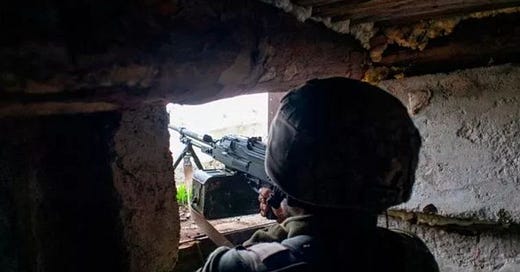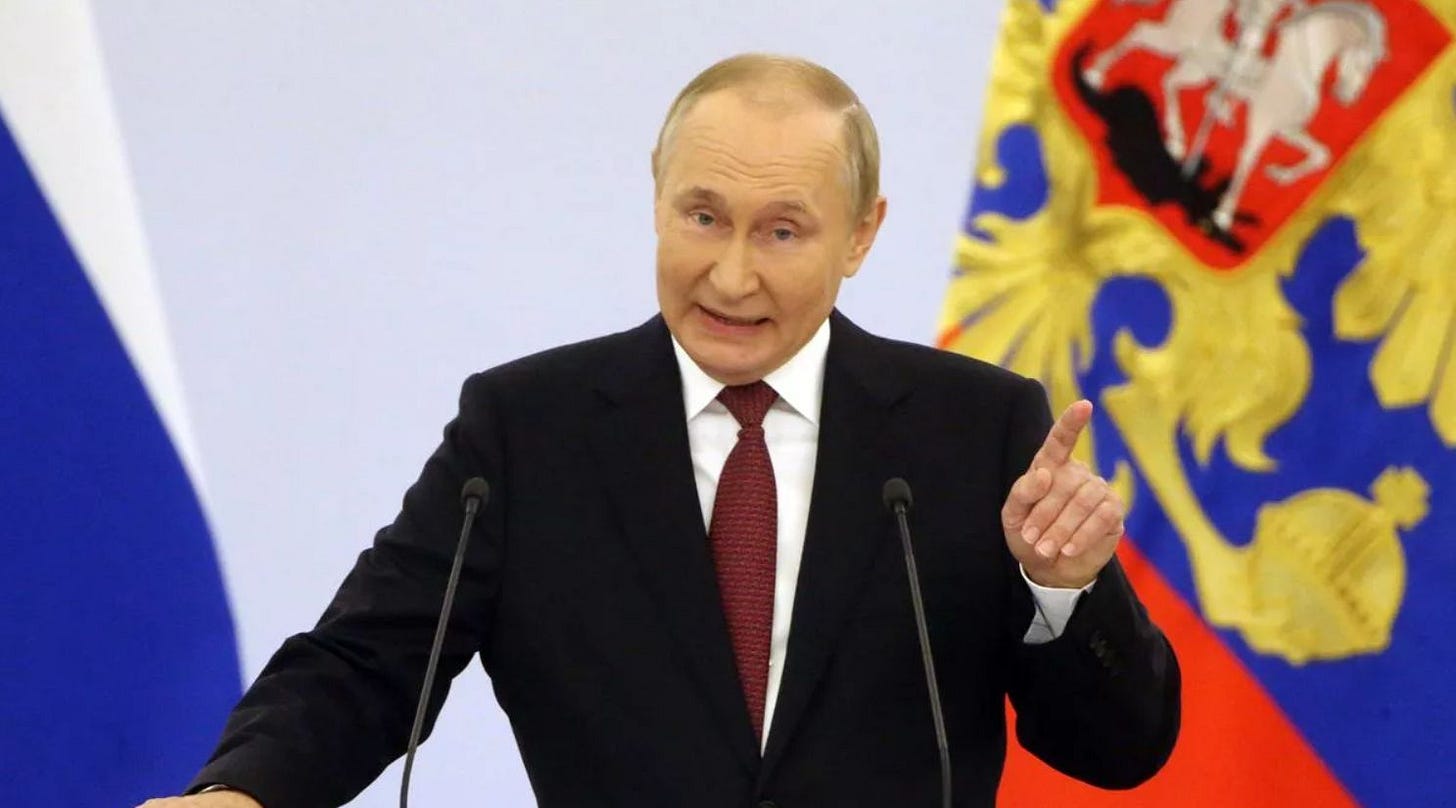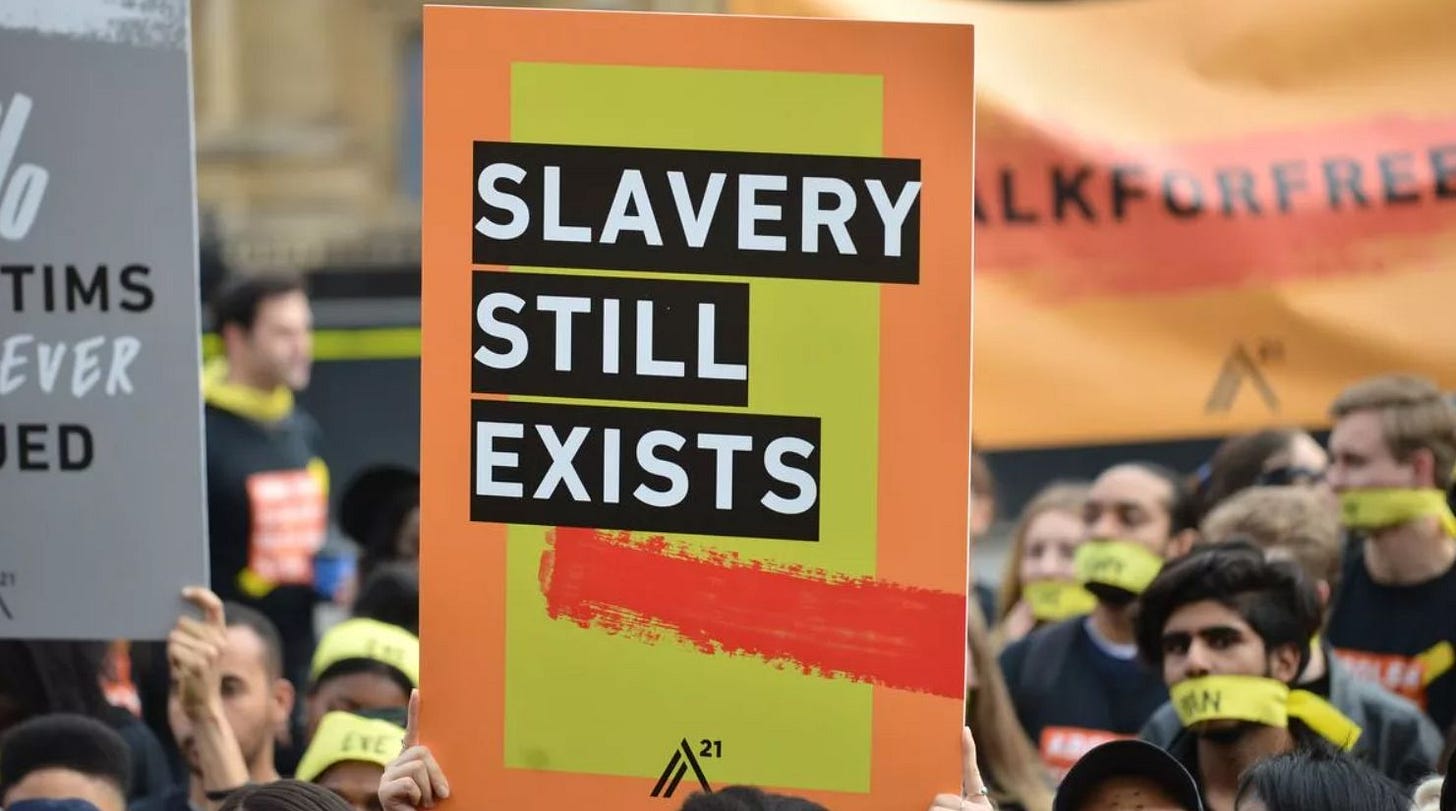Is the Third World War already under way?
This week I discuss fears of a Third World War – though, did it start some time ago? And, horrifying stats regarding people-trafficking and modern-day slavery, plus a sober warning about cyber-war
Hello and welcome to Hostile World with Chris Hughes, a weekly newsletter about the world of defence and geopolitics. You can subscribe here and follow me on Twitter @defencechris. Thank you!
SOON after Russia’s full-scale invasion of Ukraine began, President Zelensky warned that the Third World War may have started. More recently he said it has actually begun.
As I and other journalists witnessed the devastation left by Vladimir Putin’s troops outside Kyiv last year when they fled back to Belarus, we could have been forgiven for saying it certainly felt like it.
But I had also been in the trenches in Donbas in the months running up to the February onslaught and bullets and mortars were already flying then. In fact, it’s worth remembering that they had been for eight years.
The reason the Ukrainians refer to the “full-scale invasion” is to remind the world that Russian troops had in fact partially invaded their country in 2014 with their illegal land-grab in Crimea and the parts of Donbas, the latter swamped with pro-Kremlin agents and active GRU officers, as well subjected to a propaganda blitz, for some time.
But it is possible, many believe, that in fact in some form of Third World War began some time before and has been raging, both under the surface and in plain sight for a few years.
Given the ferocity of the war in Ukraine it is even possible that never have Eastern and Western weapons been unleashed towards each other in such volume, perhaps not since Korea or Vietnam.
And as world powers jostle for position, under the proxy nature of this and other conflicts in the Middle East and Africa, does it mean that in this “grey zone” of asymmetrical warfare, the Third World War started some time ago?
My old friend “David” a former British intelligence officer tells me: “You have to say, yes, it has already begun because the nature of warfare has changed so dramatically.
“Because of technology, social media, changes in politics, it’s no longer just a case of tank against tank, soldier against soldier - that’s just part of it.
“We had the Cold War and that is well over and we have moved into a hybrid-style warfare where so much is happening deep in the grey zone and there are so many different systems being used to attack.
“Putin is doing what he is doing, attracting support from similarly despotic regimes, attacking Ukraine physically and meanwhile launching espionage, influence, coercion, and cyber-attacks against Kyiv and its allies.
“We, that is the West, meanwhile, are doing all we can to take apart, degrade, damage his system at home, destroy his economy which he has used to pay for his war, to undermine the Russian political system and the Russian military. We are in a kind of interregnum period, which is hard to define – or you could say this is what World War III actually looks like.
“Both sides are providing billions of pounds of missile systems, tanks, drones and other machines of warfare, whilst mostly not actually taking part in the physical fighting.
“This is the new world way of things and it’s been going on for some time. We saw it, and some of our troops took part in this in Syria, which has become a proxy conflict being wrestled over by wider powers.”
Russian spies have targeted anti-Putin individuals in the UK, claiming many victims, even brazenly sending GRU operatives to poison ex- KGB spook Sergei Skripal, projecting blatant violence and murder on to Britain, all the way from Moscow.
And the UK has already spent £4.6billion on backing Ukraine – with a further financial donation expected next year and more demands for frontline weapons.
Leading UK defence expert on Russia, Bruce Jones, tells me: “Ever since the 2014 invasion of Crimea things have been becoming worse.
“The Russians thought they could roll up Ukraine easily with their hybrid form of warfare and they failed so fighting has intensified.
“But when you take in China’s involvement in supplying Russia with technology, Iran giving Moscow weapons, now North Korea agreeing to supply weapons to Putin’s troops, these countries are lining up behind Putin.
“There are neutral countries waiting on the sidelines but on the other side you have NATO’s supplies to Ukraine and its increasing involvement in the war.
“Those countries helping Putin have parallel enterprises and mutual aims that converge around the desire of their leaders to continue to behave like despots, to oppress and behave illegally.
“To this extent it is entirely possible to argue World War III has in a sense already been under way for some years. In fact some say it began with the attempt on Skripal’s life in 2018.
“The question is how much will the collusion of Russia’s allies spill out into acts done by countries like Iran outside the Ukraine war that Putin will have to support?”
Colonel Richard Kemp, former commander of British forces in Afghanistan and ex-adviser to the British Government says:
“Although the Ukraine conflict is a limited war when you look at the sheer volume of weapons being fired from each side and which originated from the two Western and Eastern coalitions, what is going on outside Ukraine’s border between the two sides begins to look less like a Cold War and more of a Warm War.
“Major world military powers are opposing each other and to some extent you could view this Warm War as almost a World War III albeit one that likely will not spill over its current confines inside Ukraine and Russia - unless you count espionage and asymmetrical warfare.
“It is so hard to define this period of obvious antagonism between East and West, Russia (directly supported by China, Iran and North Korea) and NATO because warfare has so many new tools which are not obvious physical killing machines or tools of physical destruction.
“But I would say it could be argued the Third World War has to a degree already started, even though it may not have the catastrophic outcome people imagine from a world war.”
Modern slavery and human trafficking warning
The horror of war reaches far beyond the life-and-death struggle for survival and dominance on the battlefield.
Staggeringly there are believed to be 50 million modern victims of slavery globally - with as many as 122,000 in the UK alone.
How terrifying is it to know that many thousands more people are enslaved in the UK than could fit into a fully packed Wembley Stadium?
It is enormously difficult to trace the causes of this but instability, poverty, crime and conflict are always major factors - with warfare right at the top.
Currently the Geneva Academy, which studies international humanitarian law and human rights, is monitoring the effects of more than 110 modern and ongoing wars.
These are happening now and can range from local tribal, ethnic and political clashes in the Middle East to major battles for control across Africa and the brutal modern-day air-strikes and trench conflict in Ukraine.
It is clear the world has not learned any lessons from previous booms in slavery and human trafficking and the risk of the vulnerable falling into it is on the increase.
The UK government is struggling to clamp down on it or even know how bad it is. This is despite the Home Secretary’s vile attempt to invoke populist fears of a “hurricane” of migrants this week.
Today, we have the launch of the UK’s new Global Commission for Modern Slavery and Human Trafficking, which is chaired by former PM Theresa May, a far less rabid and considered approach to problems related to migration.
Their major report on how widespread modern-day slavery and trafficking is will be completed in 2025 but is being compiled with the aid of real-life survivors, such Nasreen Sheikh.
In Nepal she escaped being forced to marry, fleeing to Kathmandu, where she worked as a child slave aged just ten, up to 15 hours a day. Hers is an incredible story of fortitude and struggle and her input will be invaluable.
Hopefully sympathy for her story and that of others involved in the investigation will inject some humanity into the exercise.
May may serve in this project to water down the ill-judged, incendiary and far-right comments of the Home Secretary this week regarding migration. May said: “More people are living in modern slavery today than at any time in human history.
“These crimes exist in all of our societies, and respect neither borders nor jurisdictions. Yet compared to other abuses, our collective response has been disproportionately weak.
“In 2023, we are fighting on several new fronts. We are seeing how a crisis can dramatically increase vulnerability to exploitation, with the COVID-19 pandemic, the direct effects of climate change and the war in Ukraine.
“In our digital age, trafficking is increasingly being enabled and facilitated online. And with increasingly globalised supply chains, the goods and services we consume are more likely than ever to be the product of forced labour.”
Beware the cyber warriors
October is Cybersecurity Awareness Month - possibly the least amusing and appealing of the new-age date titles but, to be fair, it’s been going for 20 years.
Nevertheless the private and public sector banded together years ago to make this time of the year one to remind everyone to be careful with their passwords.
And that’s because more than 81% of hacking-related breaches in the world, according to US-Israeli cyber company Check Point, are caused by weak password management.
This is one of the more banal areas of security which ranges from domestic theft to conflict between major powers - just what you need to cheer you up when the nights are drawing in and the cold weather boiler bill starts to mount up.
The seasonal warning goes well beyond telling you to choose a password by using a genius combination of your first dog’s name, hyphen, your first vehicle and ending up with a porn star name.
If you work at an aerospace manufacturer a compromised password can mean practically burying your company and possibly even worse, you.
More than a decade ago I was told by a very senior western intelligence contact that foreign cyber-spooks - think China, Russia, Iran, North Korea, - had stolen some research and development from an aerospace company.
This new technology, relating to a new wing, had cost billions of pounds and a few years of very bright people working very hard.
In terms of hybrid warfare this was cyber-warfare at its most devastating, offering a foreign country a free new aerospace technology breakthrough.
It also undermined the UK economy, crippled the company for some weeks as it investigated the breach and meant hundreds of thousands of pounds more a year spent on security.
The effect of a cyber breach can be mundane, a few pounds stolen from your bank account, or you could cost someone their livelihood and far, far worse.
Check Point tells me there are four essential rules for maintaining cyber security:
1: Use strong passwords and a password manager. Create codes that are at least 16 characters long and - yes, you knew it was going to be annoying - make it uniquely complex. So, avoid ABCD , 1234 - make it a riddle and don’t repeat it for other passwords.
2. Enable multi-factor authentication - or MFA. This can make you 99% less likely to be hacked. Even if the hacker cracks your code, they still face this second layer of protection.
3. Update your software and don’t put it off until later - seriously, just don’t do it. It’s obvious why. Providers issue updates to plaster over and mend security flaws. Constantly.
4. Recognise and report phishing, where malicious actors send messages pretending to be a trusted person or entity. This is the most common form of cyber-crime. Telltale clues include:
Urgent or emotionally appealing language
A sense of urgency to click right away
Requests to send personal or financial information
Unexpected attachments
Untrusted shortened URLs
Email addresses that do not match the supposed sender
And ALWAYS delete suspicious messages. Don’t reply or click on any attachment or link, including the “unsubscribe” link, which could carry a link used for phishing.
Happy cybersecurity month!
Thank you
I hope you’ve enjoyed my latest newsletter. If you have been forwarded this email and would like to sign up, you can do that right here.
Let me know your thoughts in the comments and see you next week,
Chris









